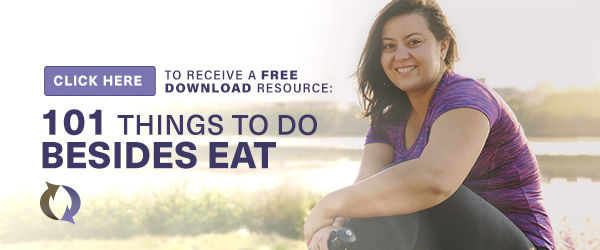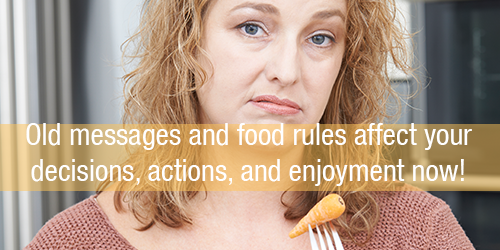Did you know your beliefs and thoughts about food have a huge effect on your eating choices? For example, many of us have the unconscious thought that we must clean our plates and never waste food. Although this message is outdated in our current food-abundant environment, it drives many people to eat more than they need. Mindful eating increases your awareness of those thoughts about food, so you can change the thoughts that aren’t helping you.
Where do our food thoughts come from?
Most of us would agree that food leaves a powerful imprint. A woman in one of my workshops once said, “Food is the background music to my life.”
 We absorb messages about food and eating from our family, friends, advertising, movies, social media, health and wellness professionals, diets, and our personal experiences (not necessarily in that order).
We absorb messages about food and eating from our family, friends, advertising, movies, social media, health and wellness professionals, diets, and our personal experiences (not necessarily in that order).
Can you remember being forced to sit at the table until you finished your vegetables? For me, it was slimy, boiled Brussels sprouts! (Ironically, roasted Brussels sprouts are now one of my favorite vegetables!) If so, what thoughts did you internalize about vegetables? (Read 7 Things Parents Say that May Contribute to Eating Issues.)
And what about your experiences with dieting? Are you aware of how they’ve affected your thoughts about eating? Often without realizing it, because of past dieting, many people think about food in terms of “good” and “bad.”
Check this for yourself. Pause for a moment and quickly generate a list of good foods and bad foods.
That’s pretty easy for most people to do! The problem is that although it seems like it’s helpful, it usually backfires.
Food rules make you bananas!
 Although I hadn’t dieted for many years, I had an experience that made me realize how deep those restrictive grooves really are.
Although I hadn’t dieted for many years, I had an experience that made me realize how deep those restrictive grooves really are.
I had an early board meeting and arrived to find a meager continental breakfast. I felt disappointed as I ate the top of a marginal banana nut muffin. (I prefer my own homemade Banana Nut Muffins pictured here, unless the muffin top is fabulous and crunchy with brown sugar and nuts!)
I could tell by looking at the muffin that it wasn’t going to measure up. As you know, I believe in eating what I love–and I wasn’t loving this. So why did I choose it?
 I looked over at the continental breakfast options and saw the bananas. They were perfectly yellow, just the way I like them, so why hadn’t I take that instead of, or in addition to, the muffin?
I looked over at the continental breakfast options and saw the bananas. They were perfectly yellow, just the way I like them, so why hadn’t I take that instead of, or in addition to, the muffin?
I suddenly realized that I hadn’t taken a banana because past dieting taught me that a whole banana counted as “two fruits” in the exchange system. As a result, I had unconsciously stopped eating bananas because I didn’t like to eat only half of something.
Really? I chose a marginal banana muffin over a banana because of the allowed serving size? Now that was funny!
Over the years of working with people who struggle with yo-yo dieting, I often hear stories about how guilt, fear, and misinformation lead to feelings of deprivation, cravings, bingeing, and even irrational food choices. While some of the stories were about “decadent” desserts, chips, and fast food, others were about grapes (“you can only have 12 so why bother”), carrots (“they are high glycemic”), nuts and avocados (“fat is bad”).
Notice what you think about food and eating
When you are struggling to manage your eating, notice whether your automatic thoughts about food are driving your decisions.
Pay close attention to old messages and food rules that may be affecting your decisions, actions, and enjoyment now. Mindful eating not only helps you more fully experience your food, it teaches you to approach eating (and living) with awareness and curiosity.
For help with increasing your awareness, read or reread the chapter Fearless Eating from Eat What You Love, Love What You Eat.
This article is updated from a previous version.
If you enjoyed this article, here are three more to help you:
Mindful Eating in Diet Culture
I crave foods I “shouldn’t” eat!
Are old beliefs causing cravings or overeating?


